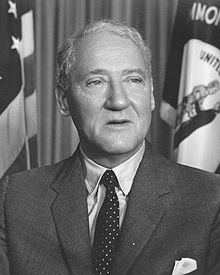John Sherman Cooper
| John Sherman Cooper | |
|---|---|
 |
|
| 2nd United States Ambassador to East Germany | |
|
In office December 20, 1974 – September 28, 1976 |
|
| President | Gerald Ford |
| Preceded by | Brandon Grove |
| Succeeded by | David B. Bolen |
|
United States Senator from Kentucky |
|
|
In office November 7, 1956 – January 3, 1973 |
|
| Preceded by | Robert Humphreys |
| Succeeded by | Walter Huddleston |
|
In office November 5, 1952 – January 3, 1955 |
|
| Preceded by | Thomas R. Underwood |
| Succeeded by | Alben Barkley |
|
In office November 6, 1946 – January 3, 1949 |
|
| Preceded by | William A. Stanfill |
| Succeeded by | Virgil Chapman |
| 5th United States Ambassador to India | |
|
In office February 4, 1955 – April 9, 1956 |
|
| President | Dwight D. Eisenhower |
| Preceded by | George V. Allen |
| Succeeded by | Ellsworth Bunker |
| Member of the Kentucky House of Representatives from the 41st district | |
|
In office 1928–1930 |
|
| Preceded by | F. T. "Tom" Nichols |
| Succeeded by | William E. Randall |
| Personal details | |
| Born |
August 23, 1901 Somerset, Kentucky |
| Died | February 21, 1991 (aged 89) Washington, D.C. |
| Political party | Republican |
| Spouse(s) |
Evelyn Pfaff (m. 1944–47) Lorraine Rowan Shevlin (m. 1955–85) |
| Alma mater |
Centre College Yale University Harvard Law School |
| Profession | Lawyer |
| Religion | Baptist |
| Awards | Bronze Star Medal |
| Signature | |
| Military service | |
| Service/branch | United States Army |
| Years of service | 1942–1946 |
| Rank | Captain |
| Unit | 15th Corps, U.S. Third Army |
| Battles/wars | World War II |
|
|
John Sherman Cooper (August 23, 1901 – February 21, 1991) was a politician, jurist, and diplomat from the U.S. state of Kentucky. He served three non-consecutive, partial terms in the United States Senate before being elected to two full terms in 1960 and 1966. He also served as U.S. Ambassador to India from 1955 to 1956 and U.S. Ambassador to East Germany from 1974 to 1976. He was the first Republican to be popularly elected to more than one term as a senator from Kentucky and, in both 1960 and 1966, he set records for the largest victory margin for a Kentucky senatorial candidate from either party.
Cooper's first political service was as a member of the Kentucky House of Representatives from 1927 to 1929. In 1930, he was elected county judge of Pulaski County. After a failed gubernatorial bid in 1939, he joined the U.S. Army in 1942. During World War II, he earned the Bronze Star Medal for reorganizing the Bavarian judicial system after the allied victory in Europe. While still in Germany, he was elected circuit judge for Kentucky's 28th district. He returned home to accept the judgeship, which he held for less than a year before resigning to seek election to A. B. "Happy" Chandler's vacated seat in the U.S. Senate. He won the seat by 41,823 votes, the largest victory margin by any Republican for any office in Kentucky up to that time.
During his first term in the Senate, Cooper voted with the majority of his party just 51% of the time. He was defeated in his re-election bid in 1948, after which he accepted an appointment by President Harry S. Truman as a delegate to the United Nations General Assembly and served as a special assistant to Secretary of State Dean Acheson during the formation of the North Atlantic Treaty Organization (NATO). Cooper was again elected to a partial term in the Senate in 1952. The popular Cooper appeared likely to be re-elected in 1954 until the Democrats nominated former Vice-President Alben W. Barkley. Cooper lost the general election and was appointed Ambassador to India by President Dwight D. Eisenhower in 1955. Cooper gained the confidence of Indian Prime Minister Jawaharlal Nehru and dramatically improved relations between the U.S. and the recently independent state of India, helping rebuff Soviet hopes of expanding communism in Asia. Barkley died in 1956, and Eisenhower requested that Cooper seek Barkley's open seat. Cooper reluctantly acquiesced and was elected to serve the rest of Barkley's term.
...
Wikipedia
